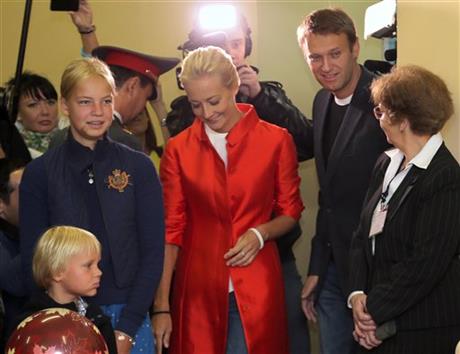
By LAURA MILLS
Russian opposition leader Alexei Navalny, with his wife Yulia, center, daughter Daria, and son Zakhar arrive at a polling station in Moscow’s mayoral election in Moscow, Russia, Sunday, Sept. 8, 2013. Moscow is holding its first mayoral election in a decade. Although an incumbent backed by President Vladimir Putin is expected to win Sunday’s election handily, the candidacy of charismatic opposition leader Alexei Navalny is changing Russian politics in ways that could pose a risk for the Kremlin in the months and years ahead. (AP Photo/Sergei Grits)
MOSCOW (AP) — Moscow was holding its first mayoral election in a decade on Sunday, a potentially pivotal contest that is energizing the small opposition in ways that could pose a risk to the Kremlin in the days and years ahead.
Although an incumbent backed by President Vladimir Putin is expected to win Sunday’s election handily, the candidacy of charismatic opposition leader Alexei Navalny has prompted a burgeoning wave of grassroots campaigning by thousands of volunteers who had not engaged in a competitive race before.
If Navalny can get more than 20 percent of the vote or even come close to forcing incumbent Sergei Sobyanin into a run-off, it could embolden the opposition in its efforts to one day drive Putin from power.
A vote seen as unfair could trigger protests, just as reports of widespread fraud in a national parliamentary election in 2011 set off the unprecedented demonstrations against Putin’s rule.
While Navalny has been allowed to run, he has been targeted by an increasingly dirty campaign, with election officials accusing him of being funded from abroad and state media giving little air time to his views.
Navalny arrived at his local polling station early on Sunday with his wife and children, saying he hoped there wouldn’t be any vote-rigging at the polls so that voters could choose “the political space they need for a new Moscow.”
Golos, Russia’s leading independent election monitor, said that there hadn’t been evidence of major violations early on.
Golos’s observers did note, however, that the voters’ lists at some polling stations had been padded with people who no longer lived in the neighborhood.
They also noted that many people coming to the polls who receive benefits or salaries from the state had clearly been forcefully encouraged to do so. One woman demanded a document stating that she had voted, supposedly as proof for the state hospital where she worked, the group said.
Anna Grishina, a retiree who came out of the polling station soon after Navalny, clutched her cane and said proudly that she’d voted for Sobyanin.
“I don’t see them,” she said, when asked about which changes Sobyanin had brought to the city. “But I hear about them on TV. He’s opened new metro stations and redone the roads. I can’t remember all of the things right now.”
The majority of people at the polls early on appeared to be elderly, a group that makes up Sobyanin’s core group of supporters. But Alexei Gorshkov, an employee in the IT sector who voted for Navalny, said he hoped the younger voters just hadn’t woken up yet.
“Sobyanin and Putin spend most of their time lining their own pockets,” said the 34-year-old. “It doesn’t matter who you vote for today, as long as you vote against Sobyanin. If there’s a run-off Navalny will have a real chance.”
Navalny had built an online following through his anti-corruption blog, but it was 2011’s protests that cemented his status as de facto leader of the opposition. He led street marches that attracted tens of thousands of people from across the political spectrum.
The election is the first since 2003 and the first since the Kremlin last year reversed Putin’s 2004 decree abolishing direct elections for the Moscow mayor and other regional leaders.
Since Putin returned to the presidency for a third term, the Kremlin has cracked down on the opposition and tried to stifle dissent.
Navalny was sentenced in July to five years in prison for embezzlement in a case that he and his supporters describe as legally dubious and punishment for his exposure of high-level corruption. He left the courtroom in handcuffs, but a day later in a surprise turnaround, prosecutors requested he be set free until his appeal could be heard.
Most have speculated that it was Sobyanin who had Navalny set free, in order to ensure that the election would look as fair as possible and legitimize the Kremlin candidate as a politician.
For Navalny, a strong showing could lead to a shortening of his prison sentence, if the Kremlin feels that this would help defuse discontent.


